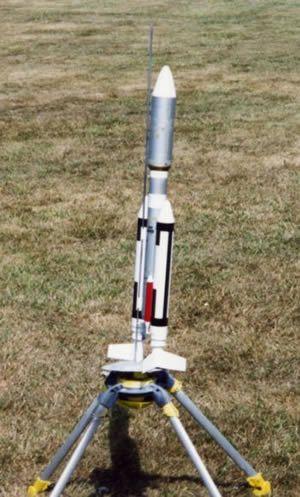| Construction Rating: | starstarstarstarstar_border |
| Flight Rating: | starstarstarstarstar_border |
| Overall Rating: | starstarstarstarstar_border |
| Manufacturer: | Estes  |
 Brief:
Brief:
The Estes 2019 Titan III E is a 1/73rd scale model of the mid 1970's vintage
Martin Marietta (now Lockheed Martin) launch vehicle. The Titan III E -
basically a Titan III with a Centaur upper stage - had a relatively short
service life with only seven launched. However its historical significance was
considerable, as it was used to launch the two Helios solar exploration
missions, the Viking I & II Mars Lander missions, and the Voyager I &
II missions to the outer planets. Estes discontinued this kit in 1993, although
nice kits show up on eBay on a regular basis (and usually sell for a reasonable
price).
Construction:
I purchased my Titan III E kits from Stefano at Sierra Fox in Italy (no, he
doesn't have any more). It seems Estes experienced something of a resurgence in
the 1990s, producing several fine skill level 3 and 4 kits, including the Titan
III E. The kit comes in a nice box, with full color photos of both the model
and the real thing.
The kit includes:-
- Three BT-60 size main body tubes
- A BT-70 body tube (for the Centaur payload section)
- A BT-50 engine mount tube and two BT-50 'fin mount' tubes
- Two fin unit body tubes (that slip-fit inside a BT-50)
- Two BT-5 'catalyst tank'detail tubes.
- Two blow molded plastic booster nose cone and nozzle pieces
- A blow molded plastic Centaur payload nose cone and adapter piece
- Four balsa catalyst tank cones
- Three sets of die-cut centering rings
- A sheet of pre-cut balsa fins
- Two sheets of decals
- A plastic 18" parachute, an engine hook, and various detail pieces.
All the parts were of typically good Estes quality, and arrived in good condition, with the exception of one decal sheet (more on that later).
The instructions are very good and nicely detailed. Construction was relatively simple and straight forward (especially considering this is a skill level 4 kit). The 'core' rocket, strap on boosters, and catalyst tanks are assembled and painted as separate assemblies before being joined together during final assembly of the rocket. Thin strips of masking tape are used to provide paint-free 'glue joint' areas on the various components. Likewise, the 'install before flight' fin units are assembled and painted as separate units. One shortcoming with the kit is that it lacks an engine block (only the engine hook prevents forward movement of the engine). I thought that rather sporty for 24mm engines, so I added a proper engine block.
Finishing:
The separate assembly of the various components made painting reasonably easy.
I used some Elmer's Filler (thinned slightly with water) to fill the body tube
seams. For the balsa components I started with a coating of Elmer's Filler
(again thinned slightly), then after sanding I followed up with a couple coats
of sanding sealer, which combined to give a nice smooth finish (yes, I know the
fins are only for flight, but I still want them to look good). I followed up
with a couple coats of primer, and then the color coat(s). There are two sheets
of decals - one back, the other gold. This is where I ran into a problem - the
decals from the gold sheet simply refused to properly adhere to the rocket.
However, it should be noted that I have also built a second .display only"
Titan III E and the decals were fine, so I suspect the decals on my first Titan
were damaged, possibly by improper storage.
Construction Rating: 4 out of 5
Flight:
I really like this rocket, and it's flown numerous times. Estes recommends a
D12-3 or a D12-5. The 3 second delay is typically a little early, while the 5
second delay is past apogee, but both work quite acceptably with flights in the
400 foot range. I've also flown it with AeroTech E18-4W and E11-3J reloads. The
three-tube profile gives the rocket a very distinctive and impressive
appearance in-flight. The necessary flight fins do distract somewhat (clear
plastic would definitely be an improvement), but the overall affect is quite
striking.


Recovery:
In addition to adding an engine block, I made one other change to the stock
kit, replacing the stock 18" plastic parachute with a similarly sized
nylon 'chute. The 18" chute is a little marginal for this rocket - the fin
units have often suffered landing damage. However I prefer using nylon
parachutes whenever practical, and a larger than 18" nylon chute would be
a tight fit in the BT-60 main body tube. One other change I should have made
was to add a Kevlar®
shock cord during initial construction. Sure enough, after several flights the
stock elastic shock cord broke (on an E11-3J, so it was well up there).
Fortunately the lower section went into a backwards 'glide', and it landed in
tall grass which cushioned it's landing sufficiently to prevent significant
damage (although finding it in the tall grass was a bit of a challenge).
However the parachute, with only the mass of the nose/payload section, drifted
well down wind and was quite fortunate to find it (after an exhausting search
through heavy underbrush). My Titan III E is now equipped with a proper
Kevlar®
shock cord.
Flight Rating: 4 out of 5
Summary:
This is a great rocket - both a nice scale representation of a historically
significant booster and an impressive flyer. It does suffer from the typical
Estes shortcomings of marginal recovery components, but those are easily
corrected. To bad Estes can't be bothered to keep producing some of these fine
skill level 3 and 4 rocket kits.
Overall Rating: 4 out of 5
 |
 |
Flights
 |
 |
Sponsored Ads
 |
 |












Herman Gharib (April 15, 2013)
I found an open box of Titan III E by estes, but it does not have the construction manual in it. Can anyone help me with an uploaded scan of the manual?